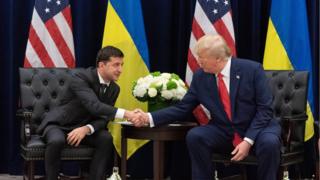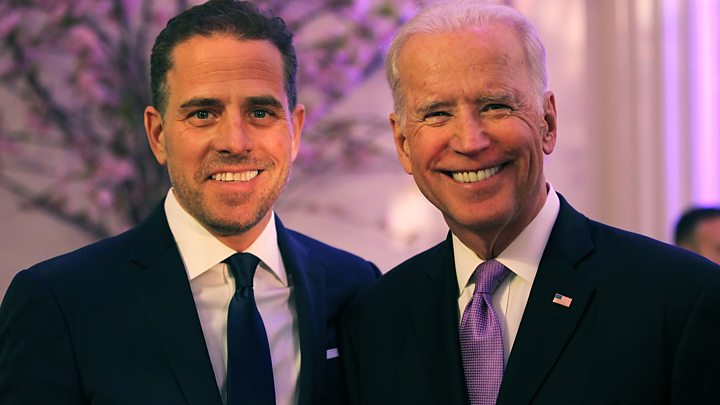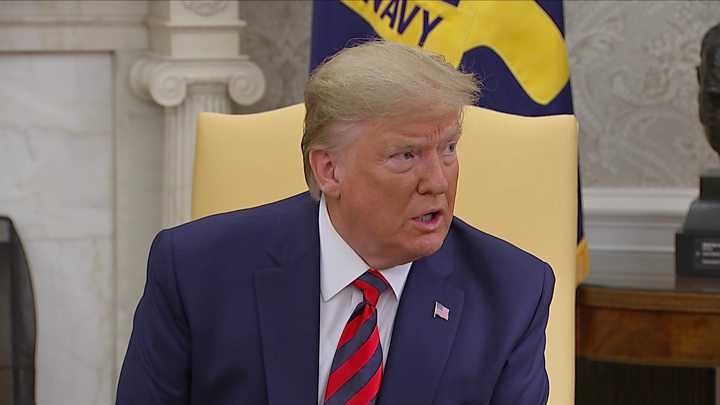The Trump impeachment story explained
You may have heard this one before – a controversy involving a foreign power could threaten the future of the Trump presidency.
Donald Trump is the subject of an impeachment inquiry over allegations that he improperly sought help from Ukraine to boost his chances of re-election.
But the story is fast-moving and complex. Let’s break it down.
President Trump is accused of breaking the law by pressuring Ukraine’s leader to dig up damaging information on a political rival.
In July, he urged his Ukrainian counterpart to investigate one of the frontrunners to take him on in next year’s presidential election. This matters, opposition Democrats say, because it is illegal to ask foreign entities for help in winning a US election.
An impeachment inquiry that could see the president eventually removed from office is under way.
But there is a fierce debate about whether Mr Trump broke the law or committed an impeachable offence. He himself says he has done nothing wrong.
At the heart of this story is a complaint from an unknown whistleblower.
In August, an anonymous intelligence official wrote a letter expressing concern over President Trump’s 25 July phone conversation with the Ukrainian president.
They said they had an “urgent concern” that Mr Trump had used his office to “solicit interference from a foreign country” in the 2020 presidential election.
A rough transcript of the call later revealed that Mr Trump had urged President Volodymyr Zelensky to investigate former US Vice-President Joe Biden, the frontrunner to take on Mr Trump in next year’s election, as well as Mr Biden’s son.
The call came shortly after Mr Trump had blocked the release of military aid to Ukraine. A senior official later testified that the president had made clear the release of this aid was conditional on Mr Biden being investigated, but the White House denies this.
Mr Trump and his supporters allege Mr Biden abused his power to pressure Ukraine to back away from a criminal investigation that could implicate his son, Hunter, who worked for a Ukrainian energy company.
But these allegations have been widely discredited. There is no evidence that Mr Biden took any action to intentionally benefit his son, nor is there any evidence of wrongdoing by Hunter Biden.
Congressional Democrats say the phone call is proof that Mr Trump broke the law by seeking foreign help to try and smear Mr Biden ahead of the election.
But there has been debate over whether soliciting opposition research from a foreign government constitutes an impeachable offence. President Trump has dismissed the growing controversy as a “witch hunt”.
Regardless, the July call is now at the centre of an effort by Democrats to expel Mr Trump from office. But for it to be successful, members of his own Republican Party will have to turn against him.
President Trump says he called his Ukrainian counterpart Volodymyr Zelensky on 25 July to congratulate him on his recent election victory. Mr Zelensky, a former TV star with no political experience, was elected president in April.
But an anonymous whistleblower, reported to be a CIA official, felt there was something more serious in their exchange. They filed a formal complaint on 12 August explaining why they were so concerned.
The whistleblower admitted they had not directly heard the call but said accounts shared by other officials had painted a consistent picture.
For context, about a dozen people are reported to have listened in on the conversation, including Secretary of State Mike Pompeo.
The call occurred days after Mr Trump blocked $391m (£316m) in military aid to Ukraine. Critics argue this was used as a bargaining chip to pressure the new government in Kyiv, but Mr Trump denies this.
The whistleblower’s complaint alleged that the president used “the power of his office to solicit interference from a foreign country” in next year’s presidential election (more on this later). They also said White House officials were “deeply disturbed” by the call and acted to “lock down” all details of it.
Amid the growing controversy, Mr Trump promised to release a “complete, fully declassified and unredacted transcript” he said would prove the call had been “totally appropriate”.
But the details disclosed by the White House were notes of the conversation. It was not a full, verbatim, account and it did little to quell the spiralling controversy.
The summary of the call showed Mr Trump had urged Mr Zelensky to investigate discredited corruption allegations against former Vice-President Joe Biden, a frontrunner for the Democratic presidential nomination in the 2020 election, as well as Mr Biden’s son.
Mr Trump and his allies have been suggesting that Mr Biden, as Barack Obama’s vice-president, encouraged the firing of Ukraine’s top prosecutor in 2015 because he had been investigating an energy company which employed Hunter Biden.
At the time, by working closely with foreign-owned entities while his father was in the White House, Hunter Biden was criticised for leaving his father exposed to suggestions of a possible conflict of interest. But no evidence has emerged that Mr Biden took any action to intentionally benefit his son.
Hunter Biden denies wrongdoing. Officials in Kiev have said there is no evidence to support the allegations.
Mr Trump pressing a foreign leader to investigate the discredited allegations against Mr Biden is significant. Mr Biden is a candidate for the Democratic nomination and, if chosen, he would be the man facing Mr Trump for the presidency in November 2020.
As Mr Biden is a leading rival for the presidency, it opens Mr Trump up to claims he was working with a foreign power to influence the election. This – crucially – is against the law.
This is not the first time Mr Trump has been scrutinised over his foreign connections. His 2016 election campaign was investigated over its alleged ties to Russia. The inquiry did not establish a criminal conspiracy to influence the election, but it also did not exonerate the president of obstructing justice.
The Democrats have launched a formal impeachment inquiry into the Ukraine affair and have spared no time in getting to work. A number of officials have been called to testify, including the US government’s special envoy to Ukraine, Kurt Volker, who turned over a trove of text messages and other relevant communications.
The acting ambassador to Ukraine, Bill Taylor, told the inquiry that Mr Trump had made the release of the military aid conditional on Ukraine opening an investigation into the Bidens’ dealings. He also said there was “an irregular, informal channel of US policymaking” in the country more generally. The White House denied this was the case.
The president’s personal lawyer, Rudy Giuliani, was subpoenaed for documents relating to Ukraine. Mr Giuliani has been central in pushing the allegations against the Bidens. Mr Pompeo has also been served with a subpoena.
But the most dramatic testimony so far has come from Gordon Sondland, the US ambassador to the European Union. He told Congress that he was working at the “express direction” of the president when pressure was put on Ukraine to investigate the Bidens. Mr Sondland added that an offer of a White House visit for Ukraine’s president was conditional on the country publicly announcing a probe.
He also implicated Mr Pompeo and former National Security Adviser John Bolton in the Ukraine dealings. “They knew what we were doing and why,” he said.
This inquiry could eventually see Mr Trump removed from office.
Impeachment is the first part – the charges – of a two-stage political process by which Congress can remove a president from office. If the House votes to pass articles of impeachment, the Senate must hold a trial.
A Senate vote requires a two-thirds majority to convict. As it stands, this is unlikely given that Mr Trump’s party controls the chamber. Unlikely, but not impossible.
Learn more about Trump and impeachment inquiry
Source: Read Full Article





